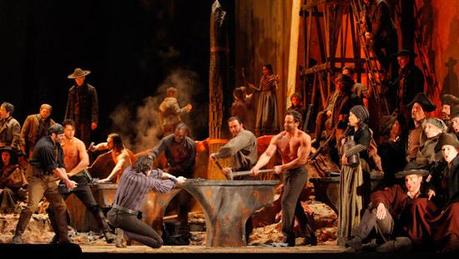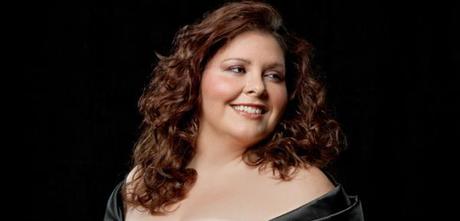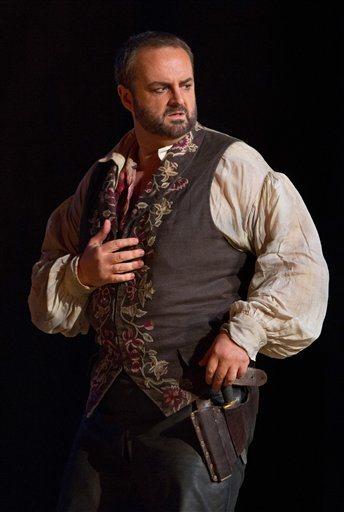
David McVicar’s Il Trovatore, Act II (metoperafamily.org)
We can thank the Marx Brothers – Groucho, Harpo and Chico – and MGM’s head of production, boy wonder Irving Thalberg, for helping prepare the way for Il Trovatore’s mass consumption with their 1935 comedy classic A Night at the Opera.
With that in mind, the Met revived their successful David McVicar production of the work with an all new radio lineup for the January 12 broadcast. Unlike previous versions of this blood and thunder drama, this was a note-complete presentation – well, almost note complete. I’ll explain in a moment.
The second of Verdi’s middle period operas, Il Trovatore was derived from one of those revenge-filled Spanish plays the Italian master so loved to transform into superior stage hits. The composer’s earlier Ernani (written by Frenchman Victor Hugo) previously fit that bill nicely, while La Forza del Destino (originally titled Don Alvaro o la fuerza del sino by the Duke of Rivas) and his later Don Carlos (based on a five-act play by Friedrich Schiller) were also Spanish-themed works before Verdi and his librettists got their artistic hands on them. We are forever in their debt, mostly because the music for these marvelous works were among Verdi’s finest for the lyric theater.
Trovatore’s score is perhaps the most melodious of the lot. However, its story line has been the object of much derision for as long as the opera’s been in existence. Regardless of that fact, any Trovatore performance stands or falls by two main factors: one, the old gypsy woman Azucena, a character at once terrifying and pitiable in her lust for all-out vengeance; and two, her son Manrico, the heroic troubadour of the title.

Soprano Angela Meade (angelameade.com)
Fortunately, the Met had two fairly decent representatives of the above who could hold their own in these roles. But they were not the stars of this broadcast. No, that honor belonged to the soprano, Angela Meade. Replacing an indisposed Patricia Racette, as Leonora – the beautiful Spanish damsel in distress who is simultaneously wooed by both the hero and villain – Meade, a 2011 Richard Tucker Award recipient, gave what can only be described as a master class in bel canto singing, in her maintaining of a firm line, in her superior diction, and in her perfect pitch and placement. This was Golden Age artistry of the highest order!
She stole the proverbial show with her two big arias, in particular her Act IV scena just prior to and immediately after the famous Miserere number – the one the Marx Brothers almost single handedly brought to ruin. Her cadenzas on “D’amor sull’ali rosee” were absolutely divine, something I’ve not heard in this role for many a decade. Meade’s trills were of the old school variety – and by that, I mean they fit the substance and mood of the piece, and were brilliantly executed to boot. The applause she generated for this astounding coloratura display was the loudest and longest of the day. Let’s hear more of this magnificent performer, shall we?
Following close behind was a thoroughly satisfying Stephanie Blythe as the crazed Azucena. Although she had a bit of trouble with her highest notes – I can recall veteran mezzos Giulietta Simionato and Fiorenza Cossotto pulling out all the stops and devouring every twist and turn of this juicy part – only American colleague Dolora Zajick has brought any semblance of fireworks to this showiest of Verdi’s mezzo creations. Despite this minor flaw, Blythe chilled the air (and the bones) with her spine-tingling rendition of “Condotta ell’era in ceppi,” where the old hag deliriously relives the tragic events of her past life, events that will come together in the opera’s closing moments. Blythe was a standout in her frequent moments with her son, and her final scene was delivered with all the thrust and power called for.

Marco Berti as Manrico (bigstory-ap-org)
Joining her in their several duets was tenor Marco Berti as Manrico. Berti’s voice is of the zesty-flavored Italian variety; a beefcake type we’re familiar with from listening to old 78 rpm’s of Aureliano Pertile, Kurt Baum, Giacomo Lauri-Volpi and other gramophone greats. I’m not placing Berti in their illustrious company, not by a long shot. But if matching these tenor stalwarts high-note for high-note were a prerequisite in this part, then Berti would be a major asset.
But first thing’s first: he has no trill to speak of, so his lovely “Ah, si, ben mio,” in Act III went by the wayside. Without those trills, the aria is shorn of its most conspicuous bel canto elements. Still, when he finally got to the rousing “Di quella pira,” the ne plus ultra of dramatic tenor moments, Berti delivered two solid high C’s that brought down the house, as well as the curtain. Verdi never wrote those notes, but tenors from Caruso to Corelli have long savored this chance to outshine the others.
Since this was a note-complete performance, as I indicated above, I was a little perturbed that Signor Berti did not give us the second stanza of his tune.Come on, it’s not all that strenuous, guys! Arnold’s big scene, “Asile héréditaire” and his fiery cabaletta, “Amis, amis, secondez ma vengeance,” from Rossini’s Guillaume Tell is a true, honest to goodness voice killer – and an absolutely smashing conclusion to the act no tenor can resist. Apparently, Berti resisted. I take it he was satisfied to have gotten this far, so there was no further need to take any unnecessary risks.
For me, the least impressive cast member was Russian baritone Alexey Markov as a robust sounding Count Di Luna. Now there’s a devil of a part for you! For eons, baritone voices from the dawn of recorded time have serenaded their lady fair with the magisterial “Il balen del suo sorriso” on their lips. From his first appearance in scene ii, however, Markov appeared to be up to his neck in treacherous high tessitura territory. This role calls for a lyric voice. And certainly the Russian homeland has had its fair share of incredibly adept talents to call on: Pavel Lisitsian, Yuri Mazurok, and today’s Dmitri Hvorostovsky are some of the best in their field. My feelings about this are that Markov was in over his head. This isn’t Figaro or Rigoletto, roles where the comedy or tragedy can often times carry the day; no, sir, this is straight arrow cantilena singing of the finest order. If you can’t make it past “Tace la notte,” the Count’s very first utterance, or “Il balen” and its continuation, “Per me ora fatale,” concluding with Leonora and Di Luna’s spirited Act IV duet (so like a similar one in Donizetti’s La Favorita), then you might as well hand in your sword. Markov made it to the end, all right, and that’s about the best I can say for him.
Greek bass Christopher Stamboglis made his network broadcast debut in the ungrateful part of Fernando, the old Di Luna family retainer. I hear some interesting things in this young man’s voice, and his future certainly bears watching. The opera was conducted by Daniele Calgary, who brought real fire and brimstone to this darkest of bel canto works. In the end, Trovatore never fails to be please the crowd. Hey, not even the Marx Brothers could destroy its versatility! It will surely survive into the next century, especially if Meade and Blythe are there to lead the way.
This broadcast rates a B+ for effort and execution.
Copyright © 2013 by Josmar F. Lopes

